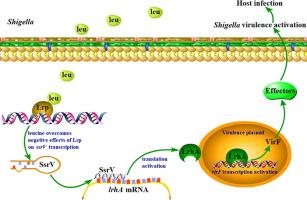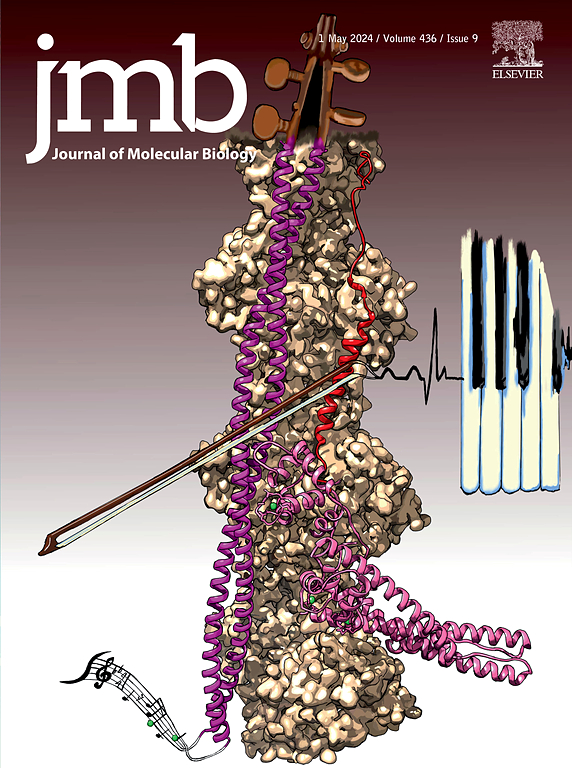Shigella Senses the Environmental Cue Leucine to Promote its Virulence Gene Expression in the Colon
IF 4.7
2区 生物学
Q1 BIOCHEMISTRY & MOLECULAR BIOLOGY
引用次数: 0
Abstract
Shigella is a foodborne enteropathogenic bacteria that causes severe bacillary dysentery in humans. Shigella primarily colonizes the human colon and causes disease via invasion of colon epithelial cells. However, the signal regulatory mechanisms associated with its colonization and pathogenesis in the colon remain poorly defined. Here, we report a leucine-mediated regulatory mechanism that promotes Shigella virulence gene expression and invasion of colon epithelial cells. Shigella in response to leucine, which is highly abundant in the colon, via the leucine-responsive regulator Lrp and the binding of Lrp with leucine induces the expression of a newly identified small RNA SsrV. SsrV then activates the expression of virF and downstream invasion-related virulence genes by increasing the protein level of the LysR-type transcription regulator LrhA, therefore enabling Shigella invasion of colon epithelial cells. Shigella lacking ssrV displays impaired invasion ability. Collectively, these findings suggest that Shigella employs a leucine-responsive environmental activation mechanism to establish colonization and pathogenicity.

志贺氏菌感知环境线索亮氨酸,促进其毒力基因在结肠中的表达。
志贺氏菌是一种食源性肠道致病菌,可导致人类严重的菌痢。志贺氏菌主要在人类结肠中定植,通过入侵结肠上皮细胞致病。然而,与志贺氏杆菌在结肠中的定植和致病相关的信号调控机制仍不十分明确。在这里,我们报告了一种由亮氨酸介导的调控机制,它能促进志贺氏菌毒力基因的表达和对结肠上皮细胞的侵袭。志贺氏菌通过亮氨酸反应调节因子 Lrp 对结肠中含量丰富的亮氨酸做出反应,Lrp 与亮氨酸的结合诱导了一种新发现的小 RNA SsrV 的表达。然后,SsrV 通过提高 LysR 型转录调节因子 LrhA 的蛋白水平,激活 virF 和下游入侵相关毒力基因的表达,从而使志贺氏杆菌入侵结肠上皮细胞。缺乏ssrV的志贺氏杆菌侵袭能力受损。总之,这些研究结果表明,志贺氏菌采用了一种亮氨酸反应性环境激活机制来建立定植和致病性。
本文章由计算机程序翻译,如有差异,请以英文原文为准。
求助全文
约1分钟内获得全文
求助全文
来源期刊

Journal of Molecular Biology
生物-生化与分子生物学
CiteScore
11.30
自引率
1.80%
发文量
412
审稿时长
28 days
期刊介绍:
Journal of Molecular Biology (JMB) provides high quality, comprehensive and broad coverage in all areas of molecular biology. The journal publishes original scientific research papers that provide mechanistic and functional insights and report a significant advance to the field. The journal encourages the submission of multidisciplinary studies that use complementary experimental and computational approaches to address challenging biological questions.
Research areas include but are not limited to: Biomolecular interactions, signaling networks, systems biology; Cell cycle, cell growth, cell differentiation; Cell death, autophagy; Cell signaling and regulation; Chemical biology; Computational biology, in combination with experimental studies; DNA replication, repair, and recombination; Development, regenerative biology, mechanistic and functional studies of stem cells; Epigenetics, chromatin structure and function; Gene expression; Membrane processes, cell surface proteins and cell-cell interactions; Methodological advances, both experimental and theoretical, including databases; Microbiology, virology, and interactions with the host or environment; Microbiota mechanistic and functional studies; Nuclear organization; Post-translational modifications, proteomics; Processing and function of biologically important macromolecules and complexes; Molecular basis of disease; RNA processing, structure and functions of non-coding RNAs, transcription; Sorting, spatiotemporal organization, trafficking; Structural biology; Synthetic biology; Translation, protein folding, chaperones, protein degradation and quality control.
 求助内容:
求助内容: 应助结果提醒方式:
应助结果提醒方式:


